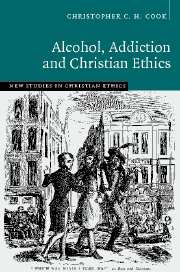Book contents
- Frontmatter
- Contents
- General editor's preface
- Preface
- 1 Alcohol, addiction and Christian ethics: introduction
- 2 An addiction in context: the use, misuse and harmful use of alcohol
- 3 Drunkenness as vice in the New Testament
- 4 Drunkenness as intemperance: Augustine, Aquinas, Luther and Whitefield
- 5 Temperance redefined: the nineteenth-century temperance movement
- 6 Addiction as sin and syndrome: the divided self
- 7 Alcohol, addiction and Christian ethics
- 8 Conclusions
- Bibliography
- Index of Bible references
- Index of names and subjects
3 - Drunkenness as vice in the New Testament
Published online by Cambridge University Press: 22 September 2009
- Frontmatter
- Contents
- General editor's preface
- Preface
- 1 Alcohol, addiction and Christian ethics: introduction
- 2 An addiction in context: the use, misuse and harmful use of alcohol
- 3 Drunkenness as vice in the New Testament
- 4 Drunkenness as intemperance: Augustine, Aquinas, Luther and Whitefield
- 5 Temperance redefined: the nineteenth-century temperance movement
- 6 Addiction as sin and syndrome: the divided self
- 7 Alcohol, addiction and Christian ethics
- 8 Conclusions
- Bibliography
- Index of Bible references
- Index of names and subjects
Summary
The history of the Christian ethics of alcohol use and misuse has roots in Hebrew and Christian scripture, and especially in the Christian New Testament references to drunkenness as a vice. A careful tracing of these roots is foundational to a complete analysis of the Christian ethics of alcohol misuse and addiction.
In the New Testament literature, drunkenness finds a place within the so-called ‘catalogues’ of vices and virtues. These catalogues, or lists, provide an especially helpful key to understanding the historical, cultural and theological context of the Christian ethics of alcohol misuse. First, they enable an estimation of the relative seriousness of the problem of drunkenness alongside a number of other vices, as understood by the New Testament authors and communities. Secondly, they enable consideration of the ways in which the problem of drunkenness was related to these other vices. Thirdly, since the practice of compiling such catalogues was adopted from the wider classical world, they enable an assessment of the way in which early Christian ethics in this field drew upon, or reacted to, other philosophical and religious systems of thought.
Before proceeding to a detailed consideration of the New Testament texts in question, it is necessary to consider what is known about the background and context of the New Testament literature, in terms of both drunkenness and alcohol misuse in New Testament times, and the literary and ethical device of compiling ‘catalogues’ of virtues and vices.
- Type
- Chapter
- Information
- Alcohol, Addiction and Christian Ethics , pp. 36 - 51Publisher: Cambridge University PressPrint publication year: 2006



